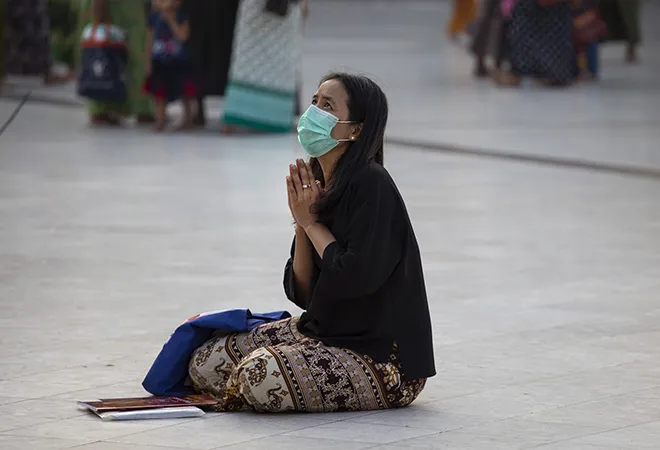-
CENTRES
Progammes & Centres
Location
Authorities need to increase testing capacities.

When Myanmar was slowly planning to return back to normal, the sudden rise of Covid-19 pandemic cases has resulted in a quite disastrous situation. The current figure stands at 4,870 cases with 81 deaths as on 19 September 2020. The first local transmission was reported in the Rakhine state on 16 August. Since then, the number of infections has quadrupled. This has led to the renewed policy of stay-at-home and has instilled fresh fear in the hearts of the citizens.
In the current situation, the word is that this second wave is deadlier since it has already infected few thousands of people in a very short of time. Another rationale for unease is the amplifying numbers of death toll.
Incidentally, a number of factors can make the second wave worse. For instance, transformation in the living habits of people, low level of immunity and specific mutation in the virus strains. The slackening of preventive measures by people has been considered as one of the major reasons for the spread.
"While warnings were cited throughout the nation to caution people of penal measures if they do not adhere to the preventive measures, even by the State Counsellor on her social media handle, people seem not to pay much heed to the advices."
In June, the nation had begun easing some of its Covid-19 restrictions. Restaurants, hotels and schools reopened. Domestic travel resumed, though there are prohibitions on visiting religious sites. However, it has been observed that for past few weeks, people have been going about with their usual course without wearing masks, or adhering to the social distancing norms. Due to the relaxation of flights, tourists also began entering the territory.
While warnings were cited throughout the nation to caution people of penal measures if they do not adhere to the preventive measures, even by the State Counsellor on her social media handle, people seem not to pay much heed to the advices. After a gap of around a month after July, the virus contacted a young man on 16 August in Rakhine with proper symptoms of Covid and then on began spreading of the virus.
Sittwe, the capital of the Rakhine state, has become the epicenter of the new wave. Rakhine has been engulfed in the internal strife for quite some time. Despite the pandemic remaining at its peak, the fight between the Arakan army and Tatmadaw is ongoing, creating more internally displaced individuals and damages to properties and lives.
If we look closely, Rakhine is the second poorest state in Myanmar. It has feeble health facilities coupled with non-availability of health personnel in some socio-economic quarters.
"Despite the pandemic remaining at its peak, the fight between the Arakan army and Tatmadaw is ongoing, creating more internally displaced individuals and damages to properties and lives."
The Rakhine state township has only one doctor per 83,000 people. The Sittwe general hospital, according to various reports, is incapacitated to accommodate a greater number of people. While educational institutions are now being planned to be converted into quarantine centres, there is a dearth of qualified health professionals. Moreover, it has been noted that the majority of people infected have no history of international travel or known contact with Covid patients. There are concerns that the state’s limited health facilities could soon be inundated.
Another possible area of alarm remains the camp areas of IDPs where the majority of displaced Rohingyas live. So far, no news regarding the spread of the virus within the camp areas have yet been reported. However, the concern still remains. The possible spread of the virus to these camps will be dangerous.
It is quite a well-known fact that the camp dwellers are more susceptible to the virus than the local populace of Sittwe. Open shelters, ill equipped water, sanitation or hygiene facilities or food arrangements tend to weaken their immunity system. On top of this, limitations to proper health care facilities and capacities remain. There are only two government-run health centres with few beds, both inaccessible to those in remote camps. They are often headed by poorly-trained medical staffs and not professionals that perform only basic treatments.
"Camp dwellers are more susceptible to the virus than the local populace of Sittwe."
These centres also lack adequate medical equipment and medicines. Though authorities say that the displaced Rohingyas are getting tested, however, the numbers of testing have not been disclosed. Another matter of apprehension has been the current reports of the possibility of positive cases among few of the health and NGO workers serving within the camp areas.
Though the nation is again trying to stop the spread and enforcing restrictions, the plausible flaws within the system is becoming more apparent. Yangon is currently affected by rising cases. Contact tracing has revealed four cases in Yangon and Mawlamyine, the Mon State capital linked to the outbreak in Rakhine. Government and media have opened blame tactics where they are tracing and flashing people’s name in various newspapers, of those who traveled from Rakhine to Yangon in the past few months.
The people are being asked to present themselves voluntarily or else legal actions will be taken against them. This stigmatisation is creating more panic and can further lead to violence or mob lynching. Rather than causing embarrassment and threats, the people need to be given adequate support, proper treatment and care. Also, the state machinery needs to ensure unity so that the nation together is able to control the present spread. More fear may lead to lesser response and further delays.
"The state machinery needs to ensure unity so that the nation together is able to control the present spread."
The government needs to increase its health infrastructure and capacity. Continued vigilance will be essential, including wearing of masks, physical distancing and maintaining hygiene practices. It is important to understand that even after a vaccine is developed, it is likely that such preventative measures will still be a must for some more time till the effects of the vaccine is ensured and stabilised.
In addition to the stay at home orders, the authorities need to increase its testing capacities. There is an immediate requirement to restore 4G internet services in the Rakhine state for ensuring proper delivery of information and services.
Ensuring safety of its displaced and stateless people is equally vital. UNHCR has provided $9.4 million programme aimed at ensuring the inclusion of stateless and displaced people. Partnership with the humanitarian and international organisations will be crucial to ensure proper funds.
While much is being said, political will and corresponding actions of the government as well as general public will be critical to tackle the second wave of infections.
The views expressed above belong to the author(s). ORF research and analyses now available on Telegram! Click here to access our curated content — blogs, longforms and interviews.

Sreeparna Banerjee is an Associate Fellow in the Strategic Studies Programme. Her work focuses on the geopolitical and strategic affairs concerning two Southeast Asian countries, namely ...
Read More +